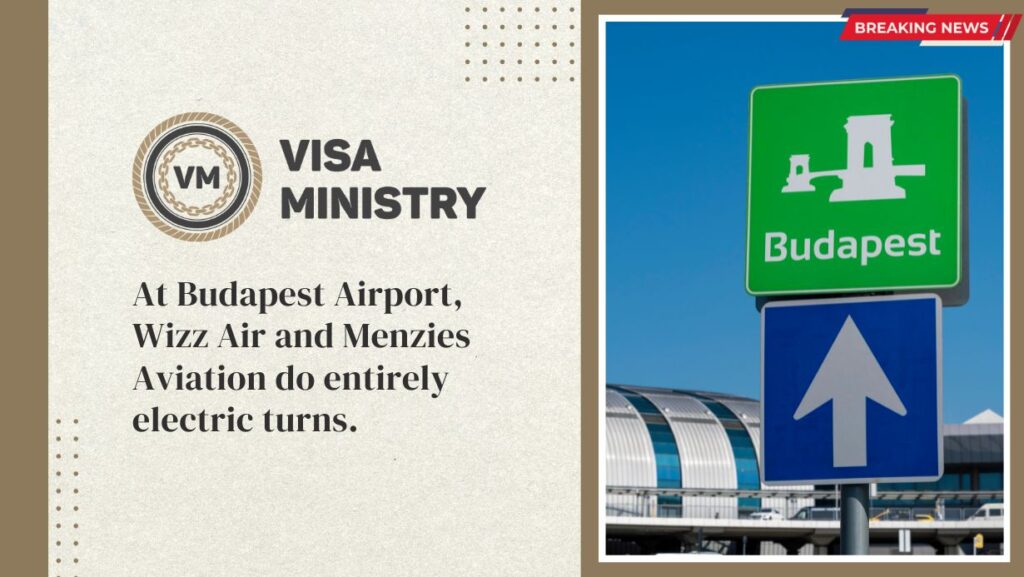This week, Wizz Air—the fastest-growing and most environmentally friendly airline in Europe—and Menzies Aviation—the top worldwide service provider to airports and airlines—announced that Wizz Air is now conducting entirely electric turnarounds at Budapest Airport.
Budapest Airport’s “green” transformation has been made possible by the establishment of the infrastructure required for electric equipment to be charged, all powered by renewable energy sources. Menzies’ “electric first” strategy, which calls for a global commitment to 25% electric GSE by 2025, lends more credence to it. Wizz Air is now able to safely depart from Budapest Airport thanks to Menzies’ use of electric luggage tractors and belt loaders, passenger steps with solar panels, a ground power unit, a pushback, drinkable water, and restroom units. These innovations also improve energy use and operational efficiency.
Compared to employing diesel-powered equipment, electric turns minimize carbon emissions from the ground handling procedure by around 80% per aircraft. At Budapest Airport, Menzies Aviation currently supplies two Wizz Air aircraft with fully electric turns at the same time.
“We are the first airline at Budapest Airport to perform fully electric turns, thanks to our partnership with Menzies Aviation and the company’s commitment to electric ground support equipment,” stated Yvonne Moynihan, Corporate and ESG Officer at Wizz Air. It is a further step toward our goal of reducing CO2 intensity by 25% by 2030. We are able to fly with the lowest carbon intensity in Europe thanks to the substantial environmental performance of our all-Airbus A321neo aircraft, which are stationed in Budapest. We also acknowledge the significance of reducing indirect emissions and applaud Menzies Aviation’s decision to convert its diesel-powered machinery to electric power. As the biggest operator at Budapest Airport, we are happy to carry on collaborating with our regional partners to identify innovative approaches that support the industry’s overall goal of reaching its objectives.
Menzies Aviation’s Head of Sustainability & Corporate Responsibility, Katy Reid, stated: “As we grow our business and look for ways to increase our operational efficiency, sustainability is a top priority for Menzies.” We are establishing science-based goals to achieve net-zero by 2045 in scope 1, 2, and 3. We are acting by employing alternative fuels and transitioning to electric GSE where it is practical. To accomplish this goal, constant cooperation with partners like Wizz Air and Budapest Airport will be essential. With 41% of our GSE equipment in Europe now being electric, we are happy to have achieved great progress and look forward to collaborating closely with suppliers, airlines, and airports as well as other industry partners to promote more ecologically responsible operations.
Chief Financial Officer of Budapest Airport Mike Carlson said: “Achieving carbon neutrality is one of our main strategic goals, and we encourage our partners to do the same. The provision of ecologically friendly infrastructure, including a range of technology and solutions, is Budapest Airport’s responsibility. We also ask our partners to endorse our sustainability activities. As airport managers, we go above and beyond to make sure the airport runs as sustainably as we can. In the last ten years, we have cut our direct operating emissions by 65%. At the airport, there are currently over 100 electric ground handling vehicles operating daily, and there are 43 parking spaces available for charging them.
In Budapest, Wizz Air operates 14 narrow-body Airbus A321neo aircraft, which have substantial environmental benefits such as a reduction of about 50% in noise emissions, 20% in fuel usage, and 50% in nitrogen oxide emissions. Wizz Air set a record for the lowest carbon intensity in the European aircraft industry in the fiscal year 2023, with 53.8 grams.
Source- Travel daily
